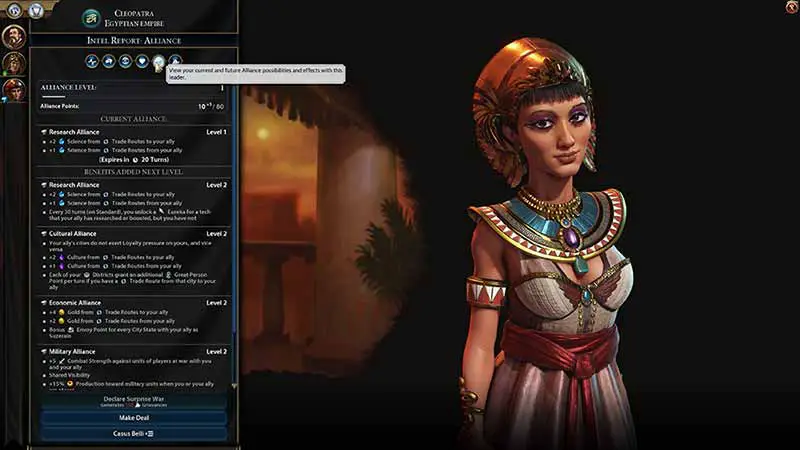
Alliances are formalized agreements between two civilizations to help each other out. You need to be friends first and before you can become best buddies you both need to have the proper Civics researched. By creating an alliance you not only get added benefits but you also get the assurance that the allied civilization will not declare war on you in the immediate future. You also get open borders and an automatic defensive pact between the two nations, and eventually added map visibility. Added map visibility might give a great location to establish another city, you read about how to do that at my Choosing Where To Settle page. If you’re new to the game or want to buy it take a look at my review, no affiliate links for that one so you can be sure that it’s an unbiased opinion.
The purpose of alliances is to gain military, research, cultural, religious, and economic benefits for your civilization. To establish an alliance both civilizations need to be friends and must have the Civil Service Civic researched. You must have the Rise and Fall DLC to have access to these Alliances.
In Civilization VI (with the Rise and Fall DLC) there are five types of alliances; Research, Cultural, Military, Religious and Economic, and each alliance type has three levels. You can only have one kind of alliance with only one civilization, meaning you are limited to five total alliances during the game. You can have two different types of alliances with the same civilization. If you have the Gathering Storm DLC each alliance provides 1 diplomatic favor per turn.
You need to be friends first before you can enter an alliance with a civilization. Some will accept your offer of friendship right away while others won’t, and if they won’t it’s typically because the AI doesn’t know you well enough to trust you. Some ways to build trust between you and an AI civilization is to ask for open borders. Another method, and one that is mutually beneficial, is to establish a trade route with your reluctant potential friend. If they still don’t want to be friends try giving them some gifts, like 10 gold, but remember these foreign leaders, just like real leaders, can be seemingly irrational at times due to their personal and hidden agendas.
Alliance Points
As your alliance grows stronger with a civilization over time you gain alliance points and advance to higher levels and these higher levels give additional benefits. Remember to renew alliances when they expire or the paranoid leader next-door may see your troop movements as a threat and declare war on you for “self-protection.” Alliances are good for 30 turns. You can strengthen an alliance faster by creating trade routes between you and your ally.
Gaining an alliance level doesn’t mean you lose the benefits of the lower level. For example, at level 1 in a Military Alliance allies both get increased combat strength if they’ve both have declared war on the same civilization. At level 3 you still get that bonus plus the level 3 bonus of having units begin the game with an extra promotion.
After thirty turns in an alliance it will be dissolved and you’ll need to declare a friendship and create an alliance again. It doesn’t need to be the same kind of alliance you previously had with this civilization. Alliance points don’t reset to zero so you will not lose any points in the process.
One thing to remember is that once an alliance is created you automatically have a defensive pact with that civilization. If someone attacks them you are automatically dragged into that war, whether you like it or not, unless you also have a defensive pact with that player as well. If someone declares war on you then they will come to your defense unless prevented by some type of treaty or defensive pact that is active between them and the player who attacked you. This isn’t true for an offensive war; chances are you’re on your own with this type of war. You also need to be careful when declaring war too since AIs will make alliances among themselves, you could end up at war with more nations than you expected. And then there’s always the possibility that someone fighting a defensive war with you will wimp out and make peace, leaving you on your own. Sound like real life?
Intel Report
When you first start an alliance with a civilization you get 1 alliance point per turn and will usually start out with a base number of 10. You also get .5 points per turn if you have a trade route with that player and another .5 points per turn if that civilization has a trade route with you. To see the current status of your alliance with another civilization you first need to open up the Intel report on your ally by clicking on the leader portrait at the top portion of the screen. Once the screen is open you’ll be at the Intel Overview screen. The Intel screen is a very informative option that provides a lot of information about your ally. There are six icons at the top of the screen and the one that should be active is the overview screen.
There are five other aspects of information you can get on your ally at this screen and the details depend on your access level with your ally. One is all the gossip you’ve overheard about your ally. Even at its lowest level you can still get an idea of what that leader’s hidden agenda is and learn who he or she has threatened recently or if they’ve recently expanded their empire.
There is an option to view the most important information you have about your ally, like how many Districts the player has created or how many wonders he or she has started. It also gives you tips on how to raise your access level with this ally so you can learn even more about that civilization.
The next icon shows the reasons for the current relationship between you and your ally and gives you tips on how to raise it or even lower it, a good thing to know just in case you want to avoid hurting your relationship with them.
The next screen is the one you’re interested in if you want to know what your current alliance level is, how many alliance points you have with them and want to know how soon it will be before you increase to the next level. It also shows you when the current agreement will need to be renewed plus it shows you what other types of alliances you can switch to with this leader if you want to. According to this screen you can switch the type of alliance you have with this player without any alliance point penalties. In other words, if your next alliance level is 2, it will be the same regardless of whether you keep the same alliance type or switch to another one.
The last option is to view any grievances you have against this leader and vice versa.
Research Alliance
A research alliance in the beginning gives each ally additional science per turn. At its highest level you or your ally get additional science points when one of you researches a technology that the other one has already finished.
Military Alliance
The first level of a Military Alliance provides combat bonuses if both you and your ally have declared war on the same nation. At its highest level it gives starting units a bonus promotion. Sometimes an ally may fail to come to your aid but you still get the bonuses against the attacker if he declared war on you first and your ally responded by declaring war. If an ally fails to send troops to your assistance it may be due to his political polices and beliefs so entering into a military alliance with someone who has a reputation as a warmonger, like Genghis, would make it more likely that your ally would send troops to help you out. You ally may also have some type of Alliance with the other civilization as well, preventing him or her from taking any action.
Economic Alliance
Initially with an Economic Alliance everyone involved gets more gold per trade route. As the alliance grows stronger the benefits max out with each ally gaining the Suzerain bonus on any city-states either one is the Suzerain of. Being the Suzerain (ruling nation) of a city-state has numerous benefits. As Suzerain you gain vision of all territory within three tiles of the city-state and can see all it’s units. Since a city-state you are Suzerain of is considered friendly territory your units heal much faster in their territory, plus they can be upgraded since they considered to be in friendly territory.
As an added bonus they will support you in any war, so an Economic Alliance has a few military benefits to it as well, it’s like gaining a new small ally or two who are unencumbered by any types of alliances with other civilizations.
There is also resource sharing, gaining control of the city-state’s military when at war for 30 turns by paying a levy, plus you will gain 1 Diplomatic Favor per tun if the Gathering Strom DLC is active.
Cultural Alliance
Cultural alliances begin by preventing allies from exerting cultural pressure on each other plus trade routes improve culture in both civilizations. At the highest level you get part of your ally’s Tourism and Culture from their cities.
Religious Alliance
A level 1 Religious Alliance prevents allies from exerting religious pressure on each other and trade routes between allies increase Faith income. At level 3 a Religious Alliance means you gain Faith based on how many of your citizens follow your ally’s religion plus you exert more pressure on cities who have no followers of your ally’s religion. You can read about spreading religion at my spreading religion page.
Don’t forget to visit my YouTube channel at https://www.youtube.com/channel/UCcWU6qxVisK93h5guKRVtdg

